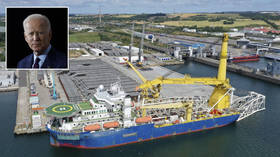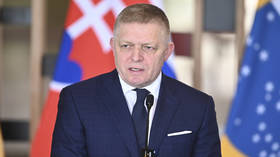As Biden’s US presidency approaches, fate of Nord Stream 2 pipeline will indicate whether Russia & EU are set for final divorce

Nord Stream 2, which is designed to deliver Russian gas to Germany, has become a barometer of relations between Russia and the EU. Its status also reflects the state of affairs within the Washington-led ‘Atlantic community’.
When it comes to major energy projects developed in cooperation between Russia and the rest of Europe, the business component of the venture is always overshadowed by geopolitical concerns. In 1981, the Reagan administration imposed sanctions on the Soviet Union to prevent it from constructing the Urengoy-Pomary-Uzhgorod main gas pipeline, designed to transport gas from the Soviet Union to Western Europe. Nearly 40 years later, history is repeating itself, as both Congress and the White House are committed to stopping Nord Stream 2 from being completed.
On opposite sides of the Atlantic, people held contradictory views about what it means to have economic relations with the Kremlin. Washington feared that its allies would get hooked on Soviet energy resources. Western European nations saw it differently: the more the USSR was dependent on the European market to sell its natural gas, the less it was interested in any ‘non-economic’ type of expansion. After long and difficult talks, Reagan was finally persuaded to lift the ban on the project.
Also on rt.com US to expand sanctions against Russia’s Nord Stream 2 gas pipelineThe circumstances around the construction of the Nord Stream 2 pipeline are a lot more complicated. Atlantic unity is in crisis, and European solidarity is breaking down, as shared goals and commitments are increasingly being replaced by strictly national interests. Because of that, members of the Atlantic community find it more and more difficult to form cohesive ties with one another. And it goes far beyond the ‘America First’ slogan promoted by Washington.
Originally, the Nord Stream pipeline was designed with German interests in mind, rather than the interests of the European Union as a whole. This approach met some opposition from a number of EU member-states. But in the mid-2000s, when the initial agreements were signed, European mechanisms for reconciliation were more effective, and relations with America were far less antagonistic, compared to today. Where in the 1970s and 1980s there used to be a coalition of powers interested in carrying out a grand new project, there is now a conglomerate of nations that share the same policy on paper, but interpret it differently.
Following the 2018 meeting with Vladimir Putin in Helsinki, Donald Trump was very open about his intentions: “We are going to be selling LNG and will have to be competing with the pipeline, and I think we’ll compete successfully, although there is a little advantage locationally.” The US-imposed sanctions are a way to offset this “little advantage.”
Congress is working the political angle: specifically, Russia can’t be allowed to make bank by selling energy resources to Western Europe, with the additional benefit of making it dependent on Russian gas. In essence, the goal of the United States – just as it was decades ago – is to prevent Russia from establishing stronger ties with other European nations interested in Russian exports. However, nowadays it is less of a priority for Washington, compared to before.
Oddly enough, the possibility that this time Western Europe will actually comply with America’s demands is higher than it was 40 years ago, given the fragmented state of the modern EU. Some members of the bloc might support the US precisely in order to strengthen its position within the ‘in-house’ European competition. Despite being part of a powerful political and economic union, these European states have, in fact, less influence than they used to under the umbrella of American power, and the guarantees it provided during the Cold War.
The loss of a clear relationship structure (which has eroded since the 1990s) did not stimulate Western Europe’s efforts to attain greater independence, but left it confused and disoriented. Absolute loyalty and commitment to the ‘collective West’ allowed the EU states to defend their own interests if pressed, as in the case of gas deals of the past century. Now that the ‘collective West’ is cracking at the seams, Germany finds itself, on the one hand, facing a crisis of political identity as the ‘most diligent transatlanticist in class,’ and on the other, having to compete with its own allies.
Also on rt.com US effort to destroy multibillion Nord Stream 2 project is ‘act short of war against Russia’ – George Galloway to Boom BustIf Berlin were to seek emancipation from American influence, the gas pipeline could become a critical landmark. Having to tackle both its domestic problems and the issues of the collective EU, Germany is, however, not ready to step outside its comfort zone. In fact, it dreads losing its role in the alliance, which has been a pillar of its political power for many decades.
The US will soon have a Democrat president, who already announced restoring relations with the EU as one of his priorities. Berlin will likely present Washington with the same arguments in favor of the gas project as Trump did: it’s not about politics, it’s about business, meaning it doesn’t undermine energy security, but strengthens it. One would expect that, guided by the spirit of mutual trust between allies, Biden’s White House will listen to the nations of Western Europe – just as Reagan did 40 years ago – and accept their reasoning as to why it is actually quite prudent to buy more gas from Russia.
Also on rt.com Biden administration will find it hard to integrate itself in a world changed by TrumpBut the Democrats in Congress have been consistently tough on Russia, initiating some of the most biting sanctions. They have taken arguments against Nord Stream 2, promoted by Eastern Europe and Ukraine, much closer to heart, unlike many of the Republicans in the US legislature. As for advocating America’s business interests, it remains a bipartisan priority. In other words, whatever team enters the White House next January, establishing another route for Russian gas supplies to Germany will not be in Washington’s interests.
If the US criminalizes any cooperation with the Nord Stream 2 project, the German government will have no way to force companies to proceed at their own risk (an example of this is the Iranian nuclear agreement: while the EU has not formally withdrawn from the deal, it simply cannot implement it because of American sanctions). As a result, Germany is in an awkward situation: to concede would mean to admit your subordinate status (which is bad for domestic reasons – the current coalition government is divided as it is), but to try and have your way could reveal political impotence. For Berlin, this is truly an uncomfortable and precarious position. Whatever the outcome of this clash of interests, the fate of Nord Stream 2 will be an indicator of the direction in which the EU chooses to develop.
Also on rt.com As US election looms, Russians have ceased to hope that anything good will come out of America, regardless of who is presidentBut what about Russia? Not long ago, at the height of the scandal with Alexey Navalny’s alleged poisoning, one of Russia’s leading experts in international relations, Timofey Bordachev, wrote: “It is probably time for Russia to act, and the logical response to the way the West is behaving would be to abort all new energy cooperation projects with Germany, including the unfinished Nord Stream pipeline, and withdraw from the institutions and frameworks that serve the interests of the United States and Europe.” The comment came as a surprise to many observers, since the dominant narrative in the West is that Russia needs the project more than Germany does and that Russia is not the one to make demands. The fact is, however, the system of gas pipelines used to be a factor of strategic stability – an aspect no less important than the commercial component. Now, its effect is the opposite; the markets are shifting; and besides, The EU has been very vocal about the need to reduce its dependence on hydrocarbons. Perhaps, the old model of selling natural gas to Europe belongs to the past, and Russia should move forward, reorienting towards other markets and new partners.
Like this story? Share it with a friend!
The statements, views and opinions expressed in this column are solely those of the author and do not necessarily represent those of RT.
The statements, views and opinions expressed in this column are solely those of the author and do not necessarily represent those of RT.













